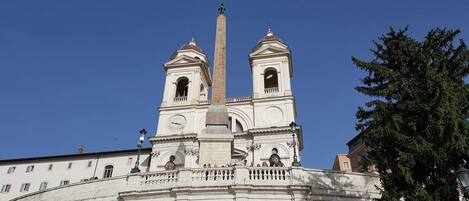Description:
Delightful apartment in the heart of Rome, in one of the oldest Roman buildings, where the first Roman bank was located. Precisely located on Via dei Coronari, on the first floor, with internal and silent view, this splendid 40sqm apartment consists of an open living room, with sofa bed, dining table, kitchenette, double bedroom and bathroom.
The apartment is equipped with the greatest comforts, TV, air conditioning, wifi, washing machine, dryer and dishwasher.
Ideal for a small family or a couple. With its optimal position it makes every attraction of the city easily reachable on foot.
Neighborhood:
Via dei Coronari is a famous street in Rome, about 500 meters long, which starts from vicolo del Curato and ends in via di Sant'Agostino in the Ponte district. In the street there is also the homonymous theater.
He appears in numerous works of Italian cinema, including for example Identification of a woman by Michelangelo Antonioni.
It owes its name to the sellers of sacred objects, in particular rosary crowns, who sold their goods here to pilgrims in transit on the way to St. Peter's Basilica.
The origin of the road dates back to the Middle Ages and was then called Via Recta, since it was one of the few regular roads in Rome at that time; moreover, it was the fastest way to reach San Pietro from the Port of Ripetta. For this reason, the street was very popular with pilgrims and, consequently, by the sellers of "crowns" (precisely the coronaries, who give the street its name) and sacred images that established their shops here.
From the beginning of the sixteenth century the road and the surrounding areas were inhabited by some of the main courtesans (high-edge prostitutes) of the time, including the famous Imperia and Fiammetta.
Also in this period, the road is conventionally divided into two parts: the first called Scorticlaria, due to the numerous leather vendors present, and the second Immagine di Ponte, due to the sacred aedicule built here in 1523 by Antonio da Sangallo the Younger on the palace of Cardinal Serra di Monserrato. The image, which represents a Coronation of the Virgin - today difficult to read, but still in its original location - was commissioned by Antonio da Sangallo the Younger to Perin del Vaga.
The street was known until the sixties of the twentieth century for the numerous junk dealers that characterized it, which then turned into antique shops.
ENGLISH
Description:
Lovely apartment in the heart of Rome, in one of the oldest Roman buildings, where the first Roman bank was located. Precisely located on Via dei Coronari, on the first floor, with internal and silent view, this splendid 40sqm apartment consists of an open living room, with sofa bed, dining table, kitchenette, double bedroom and bathroom.
The apartment is equipped with the greatest comforts, TV, air conditioning, wifi, washing machine, dryer and dishwasher.
Ideal for a small family or a couple. With its optimal position it makes every attraction of the city easily reachable on foot.
Neighborhood:
Via dei Coronari is a famous street in Rome, about 500 meters long, which starts from vicolo del Curato and ends in via di Sant'Agostino in the Ponte district. In the street there is also the homonymous theater.
He appears in numerous works of Italian cinema, including for example Identification of a woman by Michelangelo Antonioni.
It owes its name to the sellers of sacred objects, in particular rosary crowns, who sold their goods here to pilgrims in transit on the way to St. Peter's Basilica.
The origin of the road dates back to the Middle Ages and was then called Via Recta, since it was one of the few regular roads in Rome at that time; moreover, it was the fastest way to reach San Pietro from the Port of Ripetta. For this reason, the street was very popular with pilgrims and, consequently, by the sellers of "crowns" (precisely the coronaries, who give the street its name) and sacred images that established their shops here.
From the beginning of the sixteenth century the road and the surrounding areas were inhabited by some of the main courtesans (high-edge prostitutes) of the time, including the famous Imperia and Fiammetta.
Also in this period, the road is conventionally divided into two parts: the first called Scorticlaria, due to the numerous leather vendors present, and the second Immagine di Ponte, due to the sacred aedicule built here in 1523 by Antonio da Sangallo the Younger on the palace of Cardinal Serra di Monserrato. The image, which represents a Coronation of the Virgin - today difficult to read, but still in its original location - was commissioned by Antonio da Sangallo the Younger to Perin del Vaga.
The street was known until the sixties of the twentieth century for the numerous junk shops that characterized it, which then turned into antique shops.







